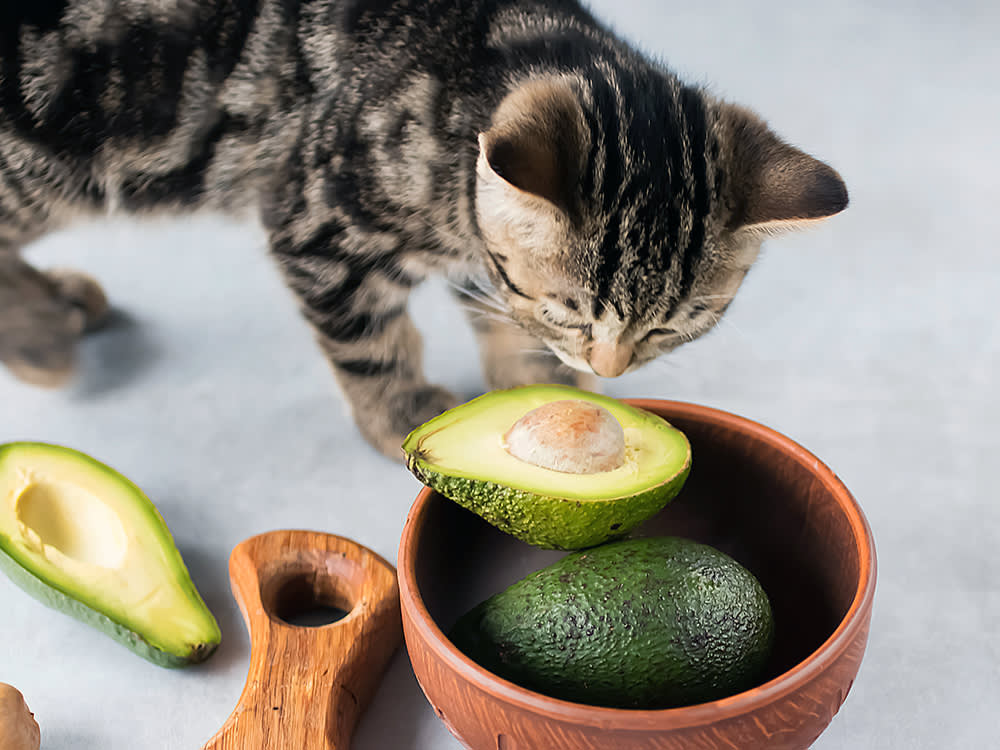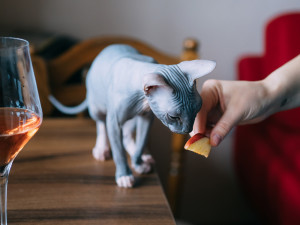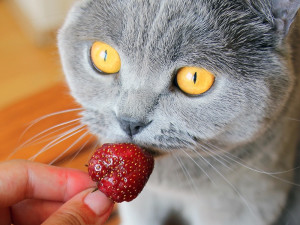Can Your Cat Be an Avocado Aficionado?
Just don’t get out the guacamole bowl.

share article
There are few and precious foods that are actually good for us and legitimately good, without adding cheese, salt, pepper, or any other enhancements. Avocado, with the caveat that everything written so far is completely subjective to the person who wrote this, is one of those foods.
Avocado tops a list of super foods for humans because it’s chock-full of antioxidants, fiber, magnesium, healthy fats, and vitamins B6, C, and E. Cats benefit from nutrient-rich diets, too, but that doesn’t mean guacamole and avocado toast should be a regular part of our diets.
Avocado flesh (also called meat) is safe for cats to eat. In fact, there is even some researchopens in a new tab showing that avocado meal, made from the leftover pulp from avocado oil extraction, could be used as a sustainable source of fiber in commercial cat foods. While there are no guarantees that your finicky feline will like the flavor and creamy texture, you can offer up a few small pieces to test their appetite for avocados.
What Makes Avocado Bad for Cats?
The high fat content in avocado flesh could cause gastrointestinal upset, especially in large quantities. Don’t give avocado to cats who have sensitive stomachs opens in a new tabor have been diagnosed with diseases such as gastritis or pancreatitis. Even in healthy cats, Dr. Autumn Vetter, clinical assistant professor at the University of Georgia Pet Health Center, suggests watching for signs like vomiting opens in a new taband diarrheaopens in a new tab to see if your cat has a negative reaction to avocado.
Never offer your cat the leaves, stems, peel, or pit of an avocado. These parts contain a toxic compound called persin, which is highly toxic to dogs and birds, causing shortness of breath and heart failure. It’s also a good idea to avoid avocado oil, which is could also contain oils from the pits — the most concentrated source of persin. While persin doesn’t appear to affect cats, out of an abundance of caution, Dr. Vetter advises steering clear of the oil.
Finally, you should always skip the guacamole. It’s made with avocado flesh, which is safe for cats, but it can also contain onions and garlic, which can cause severe gastroenteritis (and symptoms like nausea, vomiting, drooling, and stomach pain).
What Should I Do If My Cat Eats Avocado?
Small quantities of avocado flesh should be safe for cats and the most common side effect may be stomach upset. If your cat feasts on an entire (unpeeled) avocado, call your vet or the ASPCA Poison Control hotline for advice.
Avocado pits could also be a chokingopens in a new tab hazard. “Avocado pits are pretty large, so cats may not try to eat them whole,” Dr. Vetter adds. “If they do, it could get stuck in their airway.” If you suspect your cat has swallowed an entire pit, a trip to the emergency vet is in order.

Jodi Helmer
Jodi Helmer is a North Carolina-based freelance writer who shares her home with an embarrassing number of rescue dogs and relies on four feral cats to patrol the barn. When she isn’t refilling food and water dishes, Jodi writes about animals for Scientific American, Sierra, WebMD, AKC Family Dog, Living the Country Life, and Out Here.
Related articles
![A gray Sphynx cat sniffing an apple slice held out by her owner while standing on a table next to a glass of wine]() opens in a new tab
opens in a new tabCan Cats Eat Apples?
Yes, but the fruit might not hold much a-peel.
![Grey cat eats a strawberry]() opens in a new tab
opens in a new tabCan Cats Eat Strawberries?
Soon, they’ll be demanding you make this strawberry ice cream recipe on repeat.
![Dark grey cat eating two slices of break laid on top of a wooden railing of an outdoor deck]() opens in a new tab
opens in a new tabCan Cats Eat Bread?
Go ahead and give your carb-loving cat a few bites, but don’t hand over the bread basket.
![Two grey cats eating dog food from a plate while a brown dog looks on with jealousy]() opens in a new tab
opens in a new tabCan Cats Eat Dog Food?
Dog food is safe for cats in small amounts, but it shouldn’t be their main course.
![A woman eating peanut butter toast with her cat laying on the table]() opens in a new tab
opens in a new tabCan Cats Eat Peanut Butter?
The sweet and salty treat is okay in moderation.






